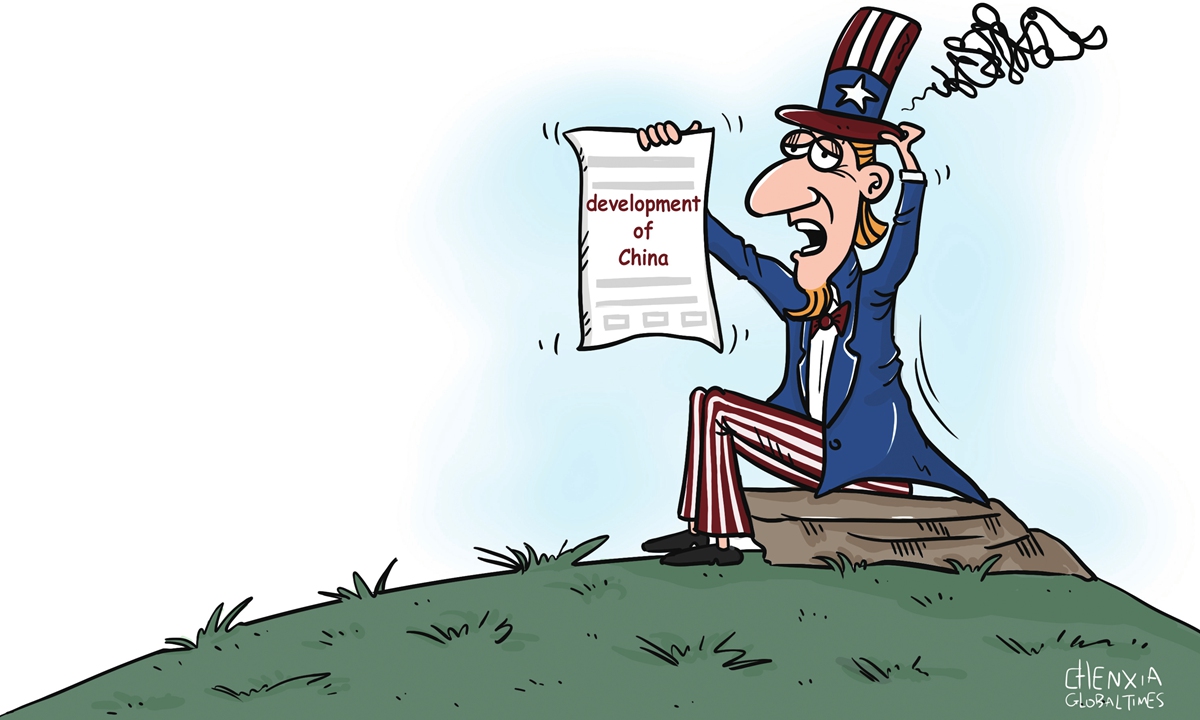China won't become ‘Americanized’ as some in US expect

Illustration: Chen Xia/GT
Many Western media outlets have simply interpreted China's recent regulation measures on internet companies, such as Alibaba and Didi Chuxing, and publicly listed tutorial companies as Chinese government's crackdown on capital. Some foreign elites view this as a move by Beijing to put capital under command of the Communist Party of China. They asserted that such measures are bound to severely damage the development of Chinese tech companies and the economy.Even Stephen Roach, a US economist and China expert, worried that China's recent moves will "strangle the Chinese economy's most dynamic sector" and sap the confidence of households and businesses. The foundation of such confidence is what contemporary China has been lacking.
However, this kind of understanding is one-sided. It is an inference based on the West's political perception of China. Once again, this shows that Western scholars have many misjudgments about China's development goals and the policy adjustments currently under way.
What is going on in China has not been closely followed. It has instead been analyzed with Western economic theory, particularly American theory. But China is on a different path from the West, and the US. The "de-Americanization," which I put forward 10 years ago, is taking place.
Only through a more specific comparison between China's development policy and the history of US' economic policymaking can people fundamentally acknowledge the ongoing reform in today's China. Such a perspective illuminates how such reforms will bring about the common prosperity of the Chinese people.
On the whole, the US is a neoliberal market economy. Although Americans always underline fairness as a basic belief, this mainly refers to the fairness of competition, emphasizing individualism and the priority of efficiency. This is the fundamental cause that has led to rampant accumulation of profits by giant US companies and the widening gap between the rich and the poor.
Since China's reform and opening-up, there has been a period in which the country put more emphasis on the free competition of the market economy. China has had the experience of learning from the US in many fields. In some ways, it has behaved very much like phases in which US capital accumulation.
However, laissez-faire competition resulted in serious consequences, especially in terms of social fairness. This deviated from the basic principles of socialism.
Therefore, the adjustment in recent years is inevitable. For example, in the field of social security, China's medical insurance plans almost all reflect the direction of the generalized system of preferences. Efforts for these are still increasing.
Recent measures on tutorial companies aim to ensure fairness in the education sector as well. It is an essential feature of Chinese education to give children a fair start in life.
China hopes to build a society of common prosperity. As a result, China has to guarantee that the development of capital power does not undermine social equity.
Daniel Zhang Yong, chairman and CEO of Alibaba Group, has an accurate understanding in this regard. He said, "Internet platform economies are new developments in the global landscape. Over the past year, we have gained a greater understanding about internet platform economies."
He continues, "We need to give more thought towards the positive value being created for society; addressing challenges related to essential technology; supporting the development of rural revitalization; becoming more environmentally friendly and sustainable."
Such a model is promoted through China's political system, which highlights Chinese characteristics and is probably unable to be fully explained by existing Western theories.
In fact, US politics is also changing in a direction that places more emphasis on fairness. But the Biden administration may not be able to fundamentally change the "nature" of American capitalism.
China's management and control will certainly make stable operations in the market economy, and more importantly, the adjustment of China's development model — taking full account of the direction of common prosperity.
This does not mean that China's adjustment will go smoothly. It is still a process of continuous exploration based on China's development practices.
The past historical development models of the market economy in China and the US seemed similar. This is why some Americans are used to applying the experience and rules of the US onto the Chinese economy. But it is now safe to say that the difference will grow between them. China will not become a more "Americanized" country as some Americans hope.
The competition between China and the US will be more focused on governance, especially ensuring that the whole of society develop in a fairer, more stable and greener way.
The author is a senior editor with People's Daily, and currently a senior fellow with the Chongyang Institute for Financial Studies at Renmin University of China. dinggang@globaltimes.com.cn. Follow him on Twitter @dinggangchina

